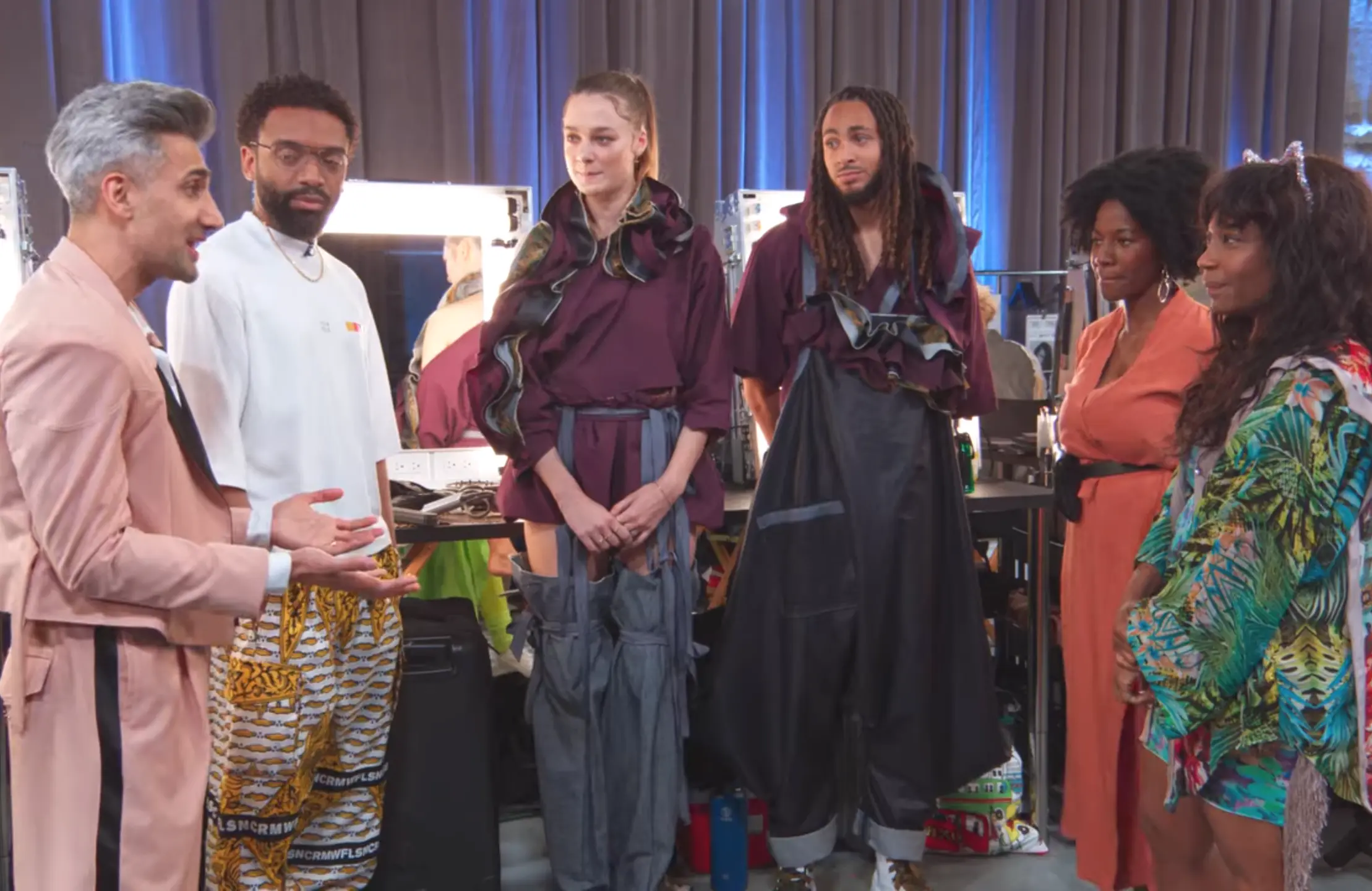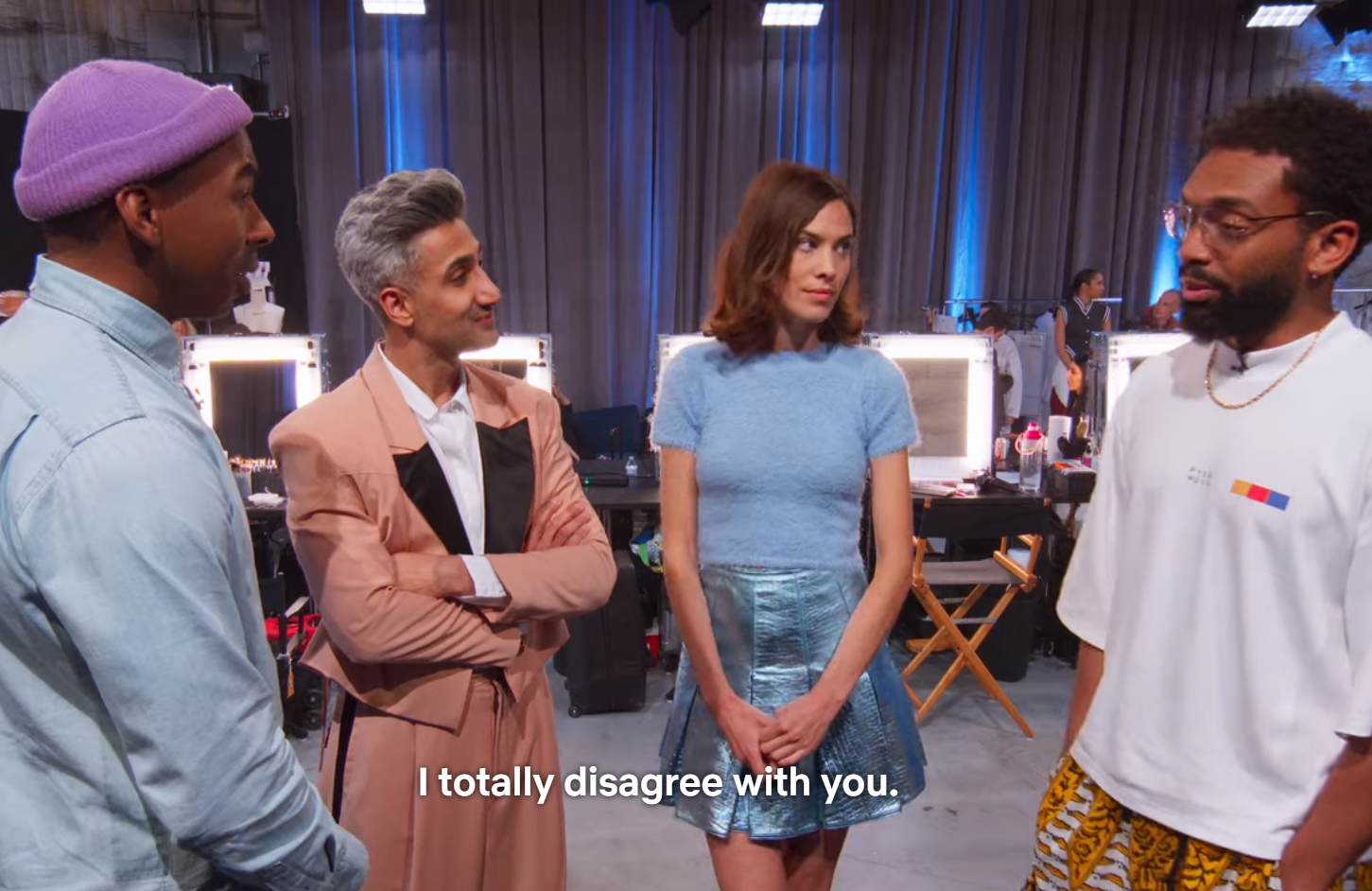Next in Fashion's Best Moment is a Window Into Fashion's Race Problem
-
 Tan France and Kerby Jean-Raymond critique Farai Simoyi-Agbede and KiKi Peterson in Next in Fashion. (Netflix)
Tan France and Kerby Jean-Raymond critique Farai Simoyi-Agbede and KiKi Peterson in Next in Fashion. (Netflix)Warning: This post contains spoilers for Next in Fashion episodes 4 and 5.
Most of Netflix’s new fashion reality competition Next in Fashion, hosted by Queer Eye’s Tan France and TV presenter Alexa Chung, is what you’d expect of a Project Runway derivative. There are challenges ranging from red carpet, to denim, to streetwear, each timed out at two days and requiring designers to call upon their design and construction skills in equal measure. Yes, there’s the added wrinkle of designers having to participate in pairs, but the end result is the same: good fashion, a dash of drama and plenty of entertainment.
But the first season, which dropped Wednesday on Netflix, develops an interesting wrinkle in episode 4. That’s the streetwear episode, featuring Pyer Moss label founder Kerby Jean-Raymond as a guest judge. (Next in Fashion, to its tremendous credit, really walks the walk when it comes to its guest judges being true movers-and-shakers in the fashion industry.) You get the sense something is up during the initial judging phase, right after the runway show. Kerby seems to be on a distinctly different page than Tan and Alexa in particular, praising the work of design team Farai & Kiki (made up of two Black women designers, Farai Simoyi Agbede and Kiki Peterson). While the two host-judges knock the construction, Kerby says they understood streetwear better than anyone else. (Seeing as Kiki is a specialist in streetwear, this makes sense.)

Things get significantly hotter during judging, though. As opposed to every other episode, where the judges are able to come to a unanimous consensus before calling the contestants back, there’s still some discord when the remaining designers come out on stage. Farai & Kiki are judged to be in the bottom two, and Farai makes a spirited defense of their voices in fashion. She remarks how unique they are — the implication being that their voices as Black women are underrepresented — and notes that they’ve had a remarkably difficult time breaking into the industry. Kerby is immediately sympathetic, and gives the best advice he can before the judges launch into full critiques.
Upon hearing the critiques, it’s clear that Farai & Kiki will be eliminated. Their critiques are the harshest, with the judges coming down on the pair’s construction of their streetwear looks. But while the other judges seemingly have other issues with the look, Kerby is insistent that theirs are actually the best looks when you consider the challenge was about looking forward in streetwear. He doesn’t flinch from this, either, and openly expresses disgust with the decision in the final judgment phase.
And then he walks out. Kerby protests the decision so strongly that he just fully leaves the staging area, and refuses to return.

The episode ends on a cliffhanger, with no elimination.
At the start of episode 5, Tan comes out to talk to the designers and emotionally admits the judges have been unable to come to a consensus. The next morning, he and Alexa break the news that no one will be eliminated. However, at the end of that next episode, Farai & Kiki once again find themselves in the bottom, with the judges fixating on one particular construction issue in their otherwise strong lingerie looks. They are promptly sent home, the judges now free of Kerby’s protestations.
This situation is a window into the fashion industry’s greater problem with race, particularly with recognizing Black women designers. This has been an ongoing issue for the industry, one that Project Runway has touched on multiple times. Kara Saun won four challenges in Season 1, only to lose in the finale to the otherwise-winless Jay McCarroll. Designer and guest judge Rachel Roy once had to argue for the value of designers of color in fashion in Season 11, when the judges wanted to eliminate Samantha Black over a white, male designer who had performed worse. Season 12’s Dom Streater remains the only Black woman to win the 18-seasons-running reality show.
The most significant example of such a situation, though, was in Season 12’s final four episode, when Kimberley Goldman made an argument for her voice as a Black woman in fashion that was likely a major factor in her advancing to the finale. It was the kind of direct address about an underlying issue that too rarely comes up on Project Runway, but seems to be more part and parcel of Next in Fashion so far.
My own opinion is that Farai & Kiki were not the strongest designers in the competition, but did not deserve elimination in either episode 4 or 5. Their creative muscles were clearly on display in the streetwear challenge, and the amount of nitpicking the judges had to do in episode 5 was embarrassing. There was pretty obviously a plan for Farai & Kiki to go out around that time — not surprising, lots of reality shows have rough predetermined elimination orders — but Kerby’s protests kept them in the game for a week longer.
Still, by allowing the disagreement in episode 4 to air at all, Next in Fashion provided one of the more fascinating looks at race in a particular industry that you’ll see on reality TV this year. It’s a fascinating moment, and one that helps the Netflix series transcend. This isn’t just a fashion reality competition — it’s one that’s willing to, at least for one episode, have a difficult conversation. If only the show had been willing to give Farai & Kiki the chance Kerby so desperately wanted them to have.
Kevin O'Keeffe is a writer, host, and RuPaul's Drag Race herstorian living in Los Angeles.
TOPICS: Next in Fashion, Netflix, Project Runway, Alexa Chung, Tan France